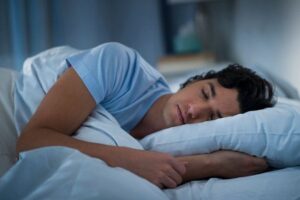Sleep Better Tonight
How much sleep do you need? Eight hours, right? That’s what we’ve always been told. But research now tells us eight hours might be too much. That makes me feel good that the sun is still up these days when I’m trying to fall asleep.
In 2002, researchers analyzed health and sleep data from one million Americans. They found that people who slept eight hours had 12 percent higher death rates than people who slept 6.5 to 7 hours. Sleeping in occasionally isn’t bad for you. But if you need more than eight hours of sleep regularly to feel rested, it might signal an underlying problem such as diabetes, heart disease, obesity, inflammation, or depression.
Sleep, like fever, is a response to inflammation. That’s why your body forces you to sleep when you’re sick—it’s fighting inflammation. But if you find you constantly need more than eight hours, there’s probably something bigger going on.

On the flip side, habitually skimping on sleep can harm your health, especially your immune system. A study published in the journal Sleep found that regularly getting less than six hours can make you 4.5 times more likely to catch a cold than if you get seven hours. And getting only four hours of sleep for just one night can cause a 72% drop in natural killer cells (your body’s first line of defense against infection). Your natural killer cells are also your body’s defense against tumors.
Sleep strengthens your immune system, just like strength training strengthens your muscles. But you need the right amount. Not enough can make you weak. Too much can be bad, too.
There’s no perfect amount of sleep for everyone, and there’s no such thing as a perfect night’s sleep. However, there’s an overwhelming amount of research pointing to the fact that most of us need around seven hours of sleep to be healthy, wake up feeling rested, and have the focus and drive to make it through the day. I firmly believe that the increased focus you get from being well rested is far more beneficial to your productivity than burning the proverbial midnight oil.
Let’s look at some tips for helping you get the sleep you need.
Establish a Sleep Pattern and Stick to It
We all run on a 24-hour biological clock called the circadian rhythm. Some people’s circadian rhythms are less than 24 hours. Some are 25 hours. The average is 24.1 to 24.3 hours.
People with longer clocks tend to be night owls. People with shorter clocks tend to get sleepy earlier in the evening. Our clocks also change over time. In our teens and twenties, we tend to be night owls. But as we age, the curve shifts, and we often become “early to bed, early to rise” people.
Don’t fight what your body wants to do. Set a schedule that works for the way you feel. Jerry Siegel, a scientist at the UCLA Center for Sleep Research says, “The simplest approach to setting a good sleep pattern is to wake up at the same time each day.”
Waking up at the same time allows your body to tell you how much sleep you need. Start going to bed at a time that will give you about seven hours of sleep. If you feel sleepy before then, go to bed earlier. Get yourself into the habit of going to bed early enough that you wake up feeling rested and ready for your day. You know this is working well when you wake up before your alarm goes off.
Don’t Drink Caffeine After Noon
When you wake in the morning and you feel well rested, very little adenosine is present in your brain. As your day progresses, adenosine attaches to receptors in your brain causing you to feel drowsy. Caffeine works by blocking adenosine receptors in your brain, helping you feel more awake and alert.
Caffeine has a half-life of 2 to 5 hours. Half-life is the amount of time it takes the body to reduce the concentration of a drug by half. The average 8 oz cup of coffee has about 95 mg of caffeine. A caffeine intake of up to 400 mg a day is considered safe. But a Venti coffee from Starbucks is 20 ounces and contains 415 mg of caffeine. If you drink that at 3:00 pm, you’ll still have a significant amount of caffeine in your system when you go to bed. If you drink the same amount before noon, you should be okay.
The average 8 oz cup of tea has about 50 mg of caffeine. I would recommend avoiding tea after lunch as well.

Make Your Room Cold
We did not have an air conditioner in my house until my senior year of high school. I remember lots of summer nights when it took me forever to fall asleep because of the heat.
Humans are designed to sleep outside where the temperature at night is considerably cooler than it is during the day. We are adapted to know that a falling temperature is a cue to fall asleep.
Most mammals are programmed for behaviors like nest building or curling up when our core temperature declines as a way of preparing for sleep. This process of getting warm is a key component in improving your sleep. If you have trouble falling asleep, turn the thermostat down before you go to bed. Start at 68 degrees and go down from there. Going too cold could actually keep you from sleeping well, so take your time to figure out what works best for you.
My optimal sleep temperature is 67 degrees. Yes, my electric bill is higher in the summer, but my heating bill is lower in the winter. And the extra money in the summer is worth the improved productivity I get from sleeping better.
Don’t Eat or Drink Before Bed
Putting anything in your gut before bed will mess with your sleep.
A review of all studies conducted on the impact of alcohol on sleep found that alcohol increases the time it takes you to reach rapid eye movement sleep and causes you to be more restless during the second part of your sleep. In other words, it will take you longer to enter a deep sleep, and you will wake up a lot more during the night.
You’re better off not drinking at all. But if you’re going to drink, make sure it’s on a night when you don’t have something important to do the next day like a big presentation.
As for eating, don’t consume any food three hours before bed. If you eat before bed, your food won’t fully digest. Lying down impairs digestion, which could give you acid reflux. Digestion also raises your body temperature, which makes it more difficult for you to fall asleep.
Eating right before bed won’t kill you unless you do it all the time (which could greatly increase your risk of diabetes).
Get Outside During the Day
To keep your circadian rhythm in check, your body needs to know when it’s daytime. Get outside for at least 15 minutes every day. The less confused your circadian rhythm is, the better you will sleep.

Andrew Huberman makes a big deal about spending 15 minutes outside in the sun during the first 90 minutes of your day. That’s great if you have the time (or don’t have 4 kids to get to school). Other sleep experts say going outside any time of the day is beneficial for your sleep. I’m with them. Get outside, in nature, go for a walk, as often as you can.
Exercise, But Not Before Bed
Analysts at The Sleep Foundation looked at all the studies involving exercise and sleep. They concluded that “people who experience poor sleep are less active than those with healthy sleep cycles. In particular, people with certain sleep disorders are not as likely to exercise during the day.”
We’ve had a lot of new clients tell us they didn’t sleep well before starting our program. After their first workout, almost all of them have told us they slept better for a couple of days. After a few weeks, most of them tell us they sleep better all the time.
Strength training and daily physical activity will improve your sleep. But don’t do it too close to bedtime. A leisurely walk isn’t so bad and could actually relax you before bed. But an intense workout will elevate your core temperature for at least two hours, which will keep you from falling asleep.
Hope you sleep better tonight.
Stay Strong,
Bo Railey

